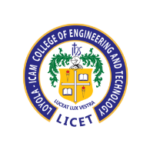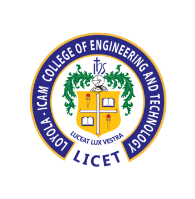Mechanical Engineering
Outcome Based Education
The department’s teaching and non-teaching faculty are highly trained, knowledgeable, and committed, with some having over 30 years of experience. There are six doctorates available to help students with project modeling and management. Students benefit from labs with cutting-edge resources and equipment. We have professionally trained faculty to teach students on “Design Thinking” which has a bright future in mechanical engineering. LICET is one of the few colleges which has an Automation lab to train the students in the most advanced machining techniques. We provide holistic formation along with engineering education to students through Jesuits pedagogy. A few of our students are doing their Master’s program in France (ICAM University), the USA (Fairfield University), and also in Germany. Apart from curricular activities, students are encouraged to participate in co-curricular and extra-curricular activities too. With the global perspective, students learn French and German languages in addition to soft skill training, interview techniques, leadership grooming, skipper programmes, motor mechanic and robotic trainings. Our students consistently perform well and secure significant ranks in national level events, namely, BAJA, GO KART conducted for engineering students. In short, it is a soul satisfying experience to be a student of the Mechanical Department of LICET.
PROGRAM OUTCOMES
PO No. | Program Outcomes |
PO1 | Engineering knowledge: Apply the knowledge of mathematics, science, engineering fundamentals, and an engineering specialization to the solution of complex engineering problems. |
PO2 | Problem analysis: Identify, formulate, review research literature, and analyze complex engineering problems reaching substantiated conclusions using first principles of mathematics, natural sciences, and engineering sciences. |
PO3 | Design/development of solutions: Design solutions for complex engineering problems and design system components or processes that meet the specific needs with appropriate consideration for the public health and safety, and the cultural, societal, and environmental considerations. |
PO4 | Conduct investigations of complex problems: Use research-based knowledge and research methods including design of experiments, analysis and interpretation of data, and synthesis of the information to provide valid conclusions. |
PO5 | Modern tool usage: Create, select, and apply appropriate techniques, resources, and modern engineering and IT tools including prediction and modeling to complex engineering activities with an understanding of the limitations. |
PO6 | The engineer and society: Apply reasoning informed by the contextual knowledge to assess societal, health, safety, legal and cultural issues and the consequent responsibilities relevant to the professional engineering practice. |
PO7 | Environment and sustainability: Understand the impact of the professional engineering solutions in societal and environmental contexts, and demonstrate the knowledge of, and need for sustainable development. |
PO8 | Ethics: Apply ethical principles and commit to professional ethics and responsibilities and norms of the engineering practice. |
PO9 | Individual and team work: Function effectively as an individual, and as a member or leader in diverse teams, and in multidisciplinary settings. |
PO10 | Communication: Communicate effectively on complex engineering activities with the engineering community and with society at large, such as, being able to comprehend and write effective reports and design documentation, make effective presentations, and give and receive clear instructions. |
PO11 | Project management and finance: Demonstrate knowledge and understanding of the engineering and management principles and apply these to one’s own work, as a member and leader in a team, to manage projects and in multidisciplinary environments. |
PO12 | Life-long learning: Recognize the need for and have the preparation and ability to engage in independent and life-long learning in the broadest context of technological change. |
PROGRAM EDUCATIONAL OBJECTIVES

Have a successful career in Mechanical Engineering and allied industries.
Have expertise in the areas of Design, Thermal, Materials and Manufacturing.
Practice their profession with good communication skills, leadership, ethics and social responsibility.
PROGRAM SPECIFIC OUTCOMES
PSO No. | Program Specific Outcomes |
PSO1 | The graduates will be able to combine their theory, hands-on and software knowledge in the field of mechanical engineering to design and develop components and provide solutions to practical problems. |
PSO2 | The graduates will be able to apply their knowledge in the field of thermal and fluid sciences to simulate and develop solutions for real time applications. |
PSO3 | The graduates will be able to apply knowledge and skill in various aspects of manufacturing technology and automation, to enhance productivity and cater to current industrial needs. |
PSO4 | The graduates will be able to engage professionally in industries or as an entrepreneur by applying modern management practices. |





